Product & Services Technology Transfer
Research & Development Products
Malaysian Nuclear Agency (Nuklear Malaysia) is a government agency that conducts research and development (R&D), services and training in the field of nuclear technology for national development. next, work to promote the use, transfer and commercialization of nuclear technology R&D results to the community. Nuklear Malaysia plays a role in providing excellent research to generate nuclear technology and new products to meet the needs of technology applications in various fields such as industry, medicine, radiation processing, environment and agriculture. some of the products produced by Nuklear Malaysia have been listed in this catalogue for marketing and technology transfer purposes. in addition to sales, Nuklear Malaysia also offers cooperation through MOA, MOU, NDA, and services with any company interested in developing and markets products to a more successful level. nuclear technology driving national vision.
| INDUSTRY |
|
MEDICAL RADIATION PROCESSING ENVIRONMENT, RENEWABLE TECHNOLOGY & SUSTAINABLE AGRICULTURE
|
For more information regarding consultations, technical services, and products from Nuklear Malaysia, please visit the Catalogue of Technical Services and Consultancy on Nuklear Malaysia's official website: https://www.nuclearmalaysia.gov.my/produkDanPerkhidmatan.php or contact En. Ahsanulkhaliqin B Abdul Wahab (Director of the Technology Commercialization Division), e-mel: ahsanul[at]nm.gov.my.
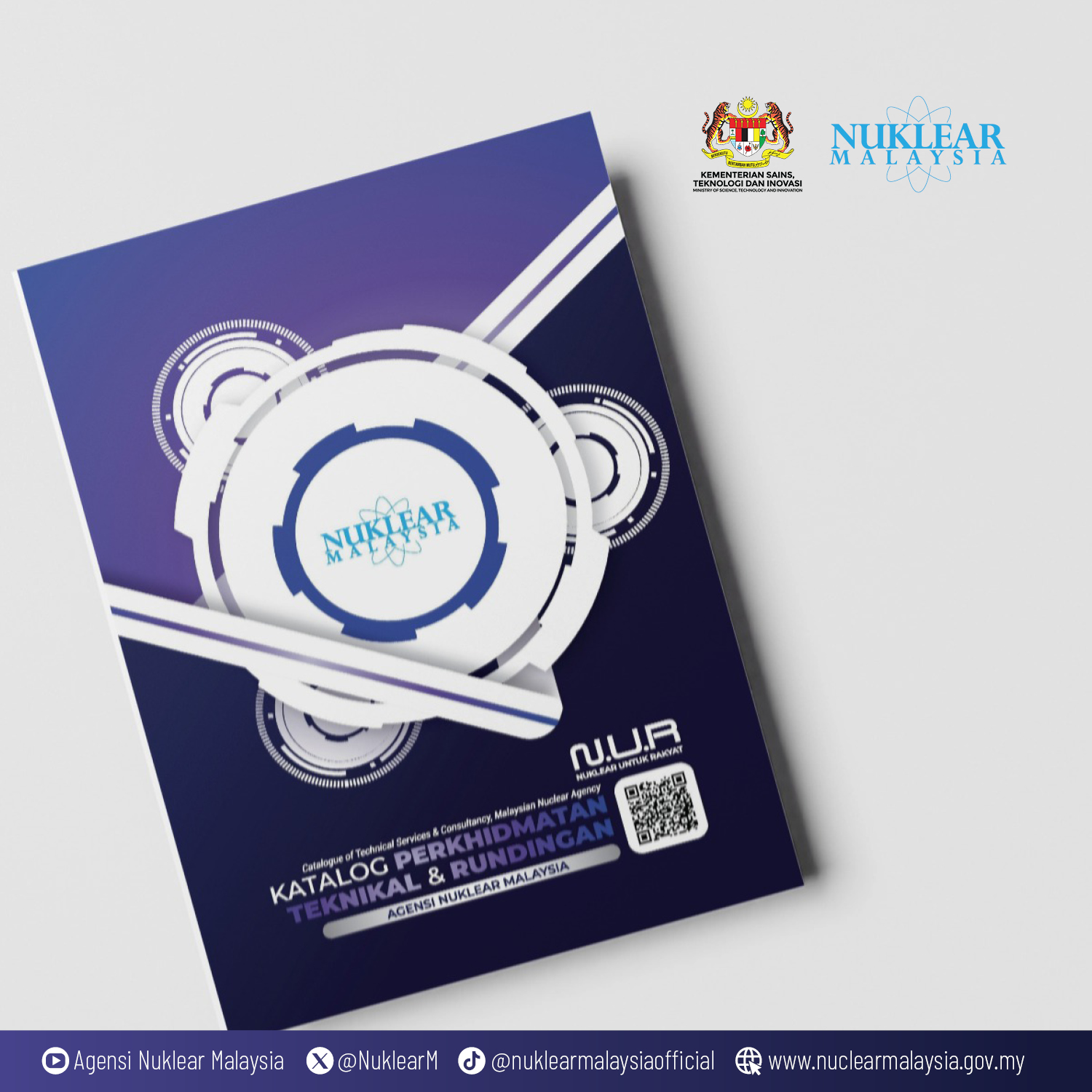
Catalogue of Technical Services Consultancy (Nuklear Malaysia) [Flipbook][PDF]
Service Centre
Reactor TRIGA PUSPATI (RTP) is a nuclear research reactor in Malaysia was commissioned in 1982 to produce neutron sources for radioisotope production, analytical services, training tool in Nuclear, Science, and Engineering that comply with national and international practices, standards, licensing requirements in the nuclear safety, security and safeguards management.
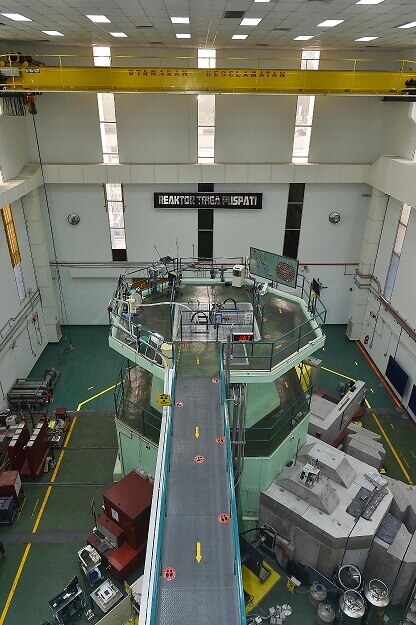
Analytical Chemistry Laboratory (ACA) is one of the laboratories established under the Waste and Environmental Technology Division, Malaysian Nuclear Agency. The laboratory plays a role in the implementation of important functions, namely: providing chemical analysis services for research groups in agencies, research communities in universities and other government agencies; providing commercial analysis services to the private sector; and providing training facilities and guidance to university students in operating analytical equipment. This laboratory applies quality control and good quality assurance practices to provide high quality output where it meets international standards.
Recently, the Analytical Chemistry Laboratory is equipped with various analytical instrument facilities such as Gamma Spectrometry System for neutron activation analysis (NAA), Inductively Coupled Plasma-Mass Spectrometry (ICPMS), Atomic Absorption Spectrometry (AAS), Ion Chromatography (IC) and CHNS Elemental Analyser. With such analytical facilities, the laboratory can provide various analytical needs for the research community and the private sector, especially in elemental analysis. Besides, the laboratory also handles various types of samples for analysis including soil, sediment, water, airborne particles/dust, biological materials, ceramics, geological materials, minerals and others.
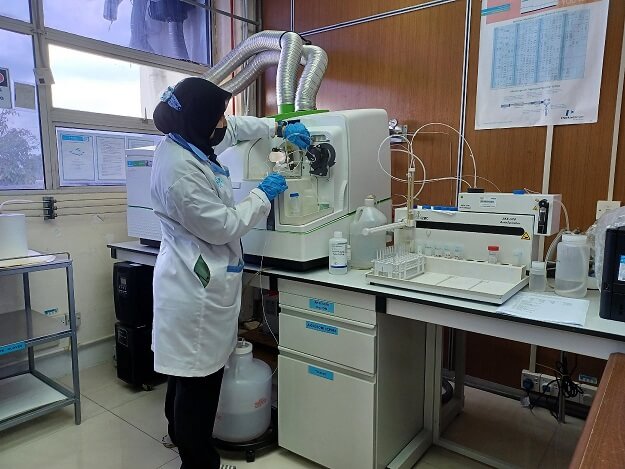
Microbiology Quality Control Laboratory was established in 1982 in parallel with the establishment of the Isotope Department. In the beginning, the activities were focused only on research work. After the Tc-99m generator was commercialized in 1990, routine microbiological testing was conducted to meet the quality assurance requirements of the product that have been manufactured by the Isotope Department. Laboratory activities were later expanded when microbiological testing services were offered to outside Nuclear Malaysia. Currently, most of the test samples received consist of radiopharmaceutical products as well as medical devices.
Meanwhile, the Biodosimetry Laboratory was established at the Malaysian Nuclear Agency in June 1990. The main activity was to perform chromosome aberration test using dicentric technique to analyze the exposure dose of industrial radiation workers in Malaysia. The equipment used is the Metaphase Finder System which assists in the searching and capturing of chromosome images at the metaphase stage. In addition to providing services, the Biodosimetry Laboratory also conducts research and collaborative projects with external parties such as AELB, IMR and university.
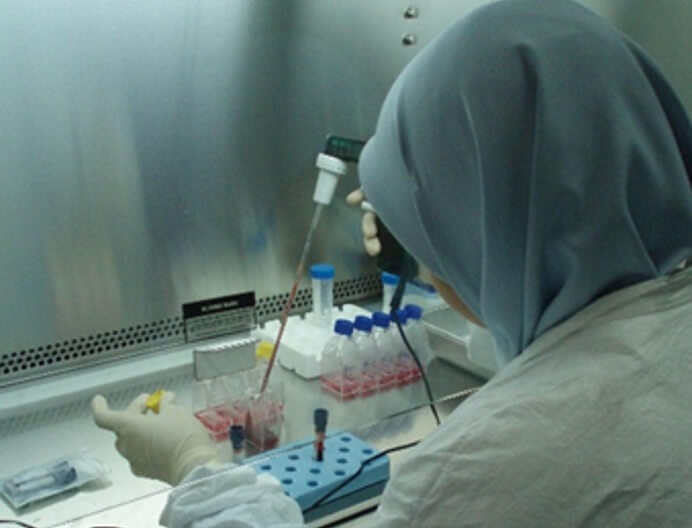
The Radioisotope Production Laboratory was established to carry out production and distribution of radioisotopes, radiopharmaceutical and radiopharmaceutical kits to hospitals and other users throughout Malaysia. The lab is equipped with various facilities such as:
- Hot-cells for Tc-99m generator production
- Hot-cells for the production of various radioisotopes
- Hot-cells for I-131 production
- Hot-cells untuk pengeluaran Ir-192
- Clean room and freeze dryer for the provision of aseptic radiopharmaceutical kits
- Clean room with GMP certification for preparation of Tc-99m generator and aseptic radiopharmaceutical kit
- Equipment for quality control such as Multi-Channel Analyzer, Automatic Gamma Counter, High Performance Liquid Chromatography (HPLC), Dose Calibrator, Polarograph Equipment, Pyrogen Testing Equipment and Sterilization Testing Equipment.
In addition, there are also laboratories that conduct phytopharmaceutical analysis services including phytochemistry tests, antidiabetic tests, antioxidant tests, toxicological tests, molecular/animal imaging.
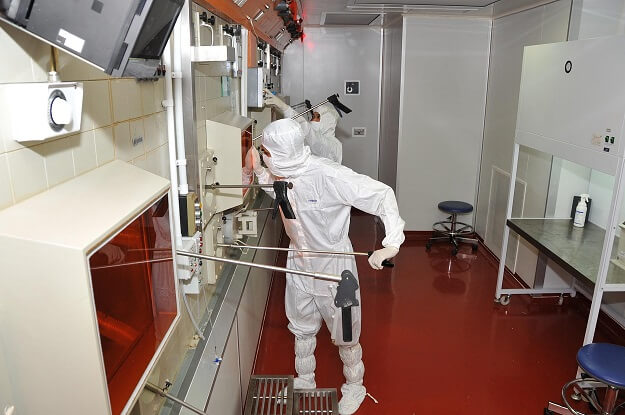
SSDL is a national center for the calibration of radiation measuring devices such as dosimeters used in radiotherapy centers and for radiation protection. The requirements for the calibration of radiation measuring instruments are enshrined under the Atomic Energy Licensing Act 1984 (Act 304), Radiation Protection (Basic Safety Standards) Regulations 1988 (amended 2010). The SSDL Calibration Laboratory has been accredited to the MS ISO/IEC 17025 standard since July 2004.
All measurements and calibrations are traceable to primary standard laboratories and other international standards. SSDL is also responsible as an Individual Dose Monitoring center for radiation workers in Malaysia by supplying and analyzing OSL Badges, TLD Badges and TLD rings. SSDL also supplies high dose dosimeters such as Ceric Cerrous and Fricke for use in the radiation processing industry in Malaysia.
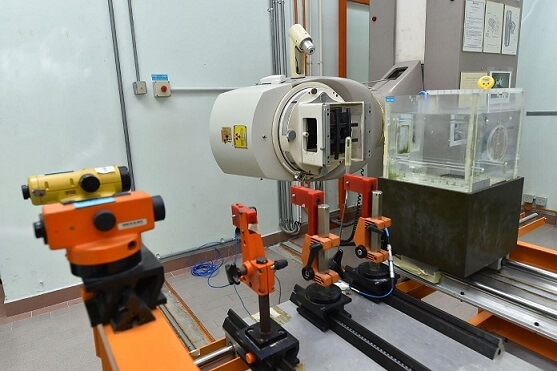
Electron Beam Irradiation Service Centre ALURTRON has two electron beam machines: a high energy 3.0 MeV machine (EPS-3000) and a low energy 200 keV machine (Curetron). Both machines come with several product delivery systems and are supported by QA / QC laboratories for dosimetry and polymer testing.
The EPS-3000 machine is widely used in commercial lighting for the purpose of Cross-linking wire and cable insulation, Cross-linking heat-shrink tubes, Cross-linking polymer materials, Cross-linking and sterilizing of pharmaceutical products such as gloves, syringes and non-set dressing, Sterilization of medical products, Flue gas treatment and Waste water & sewage of industrial treatment.
A low energy 200 keV machine Curetron is used for surface treatment of various applications in wood, plastic and steel, including particle boards, fiber boards, aluminum foil and ink.
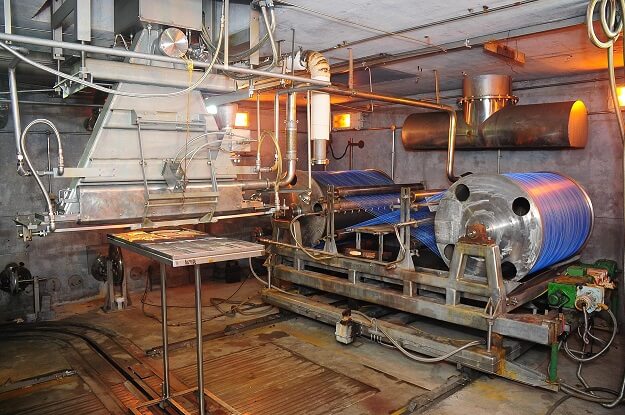
Irradiation processing services provided by ALURTRON are fast with high efficiency, high uniformity and good control. This is because the EPS-3000 machine control system is controlled by regulating the irradiation time and achieved evenly over wide areas of materials. This process is carried out at room temperature with high productivity capability.
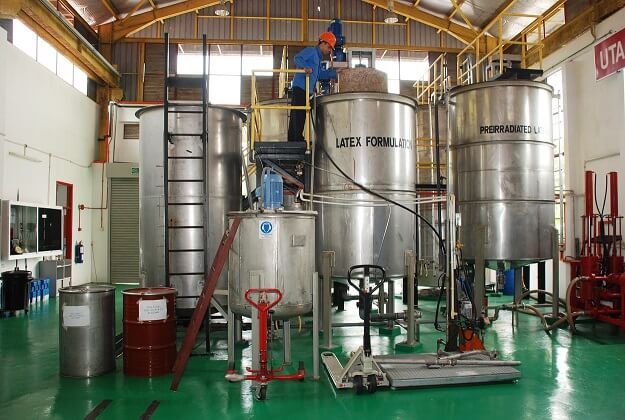
RAYMINTEX Plant is a pilot plant that conducts vulcanization of natural latex using gamma radiation known as natural latex vulcanized using gamma radiation (RVNRL). RVNRL produced by RAYMINTEX Plant has physical and mechanical properties that fulfill the requirements / specifications of various natural latex dipped products. Some major advantages and benefits of RVNRL are:
- High stability and longer storage
- The product is softer and easier due to its low modulus
- Free of nitrosamines and low nitrosatables (carcinogenic substances)
- Free from allergies created by accelerator materials
- Lower ash content and does not produce high acid combustion gases upon burning
- No copper staining / contamination problems (copper staining), suitable products used by the electronics industry
- Environmentally friendly, factories making rubber products do not produce effluents that contain high zinc content
RVRNL is suitable for the production of rubber gloves, balloons, baby puts and other products that are easily exploited by consumers.
RAYMINTEX Plant also conducts R&D activities with the aim of improving the quality of RVNRL to support promotion and commercialization of RVNRL technology, and diversification of radiation processing.
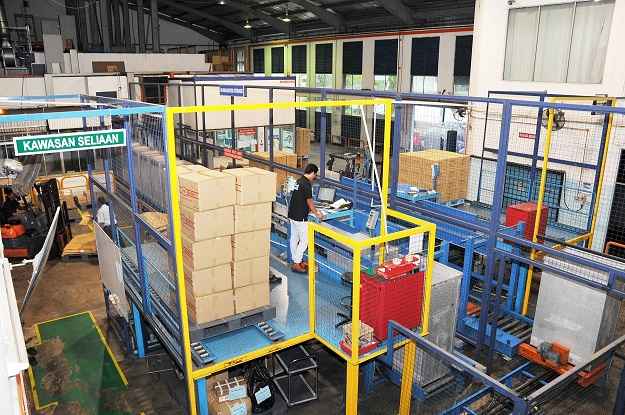
MINTec-Sinagama Irradiation Plant uses ionizing energy in the form of gamma radiation from Cobalt-60 source.This irradiation plant operates on JS10000 (IR-219) which it is able to irradiate various products requiring different doses simultaneously. Currently, MINTec-Sinagama has obtained MS ISO 9001: 2015 and ISO 13485: 2016 certification. MINTec-Sinagama was initially designed as a multi-purpose pilot facility for research and development purposes. The plant activities later diversified to offer services to the public for the sterilisation of medical products and packaging materials, decontamination of food, pharmaceuticals, herbs and animal feeds, and the disinfestations of insects in agricultural commodities, including for quarantine purposes.
The plant also provides tissue and bone sterilisation services by gamma radiation for tissue banking purposes to relevant authorities such as hospitals and National Tissue Bank.
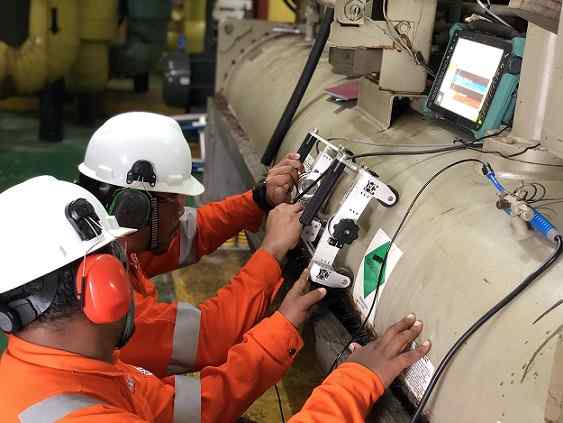
The Non-Destructive Testing Service Center (NDT) provides NDT testing services and training in the oil & gas, energy, aerospace, manufacturing and transportation industries. It is divided into two groups, namely Advanced NDT Technology (LENDT) and NDT-MSI.
LENDT Group offers advanced NDT testing services such as Digital Radiographic Testing (RT-D), Phased Array Ultrasonic Testing (PAUT), Infrared Thermography (IRT) and Laser Shearography. Agensi Nuklear Malaysia trough LENDT has been recognized by the International Atomic Energy Agency Collaborating Centre (ICC) for Advanced NDT which serves as an international reference center in the field of advanced NDT.
NDT-MSI provides services such as sub-surface monitoring and characterization using Ground Penetration Radar (GPR), Ground Electromagnetic Measurement (GEM) and measuring site density and moisture using nuclear density gauges, NDT consultation and testing in concrete structures, storage tank monitoring using Acoustic Emission (AE) and verification and maintenance of irradiation apparatus in industry.
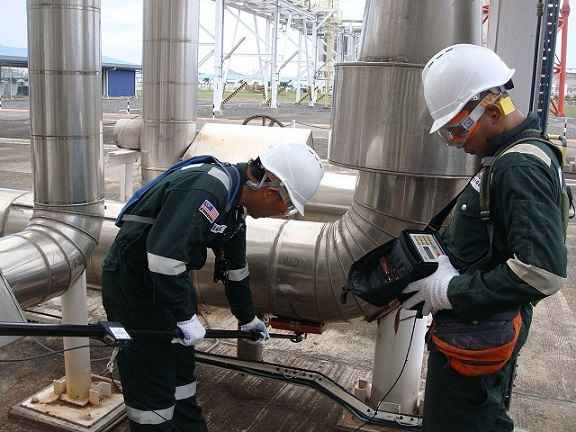
The Plant Assessment Technology (PAT) is a research group under the Industrial Technology Division (BTI) in Nuclear Malaysia and has been established for more than 30 years in the operation and maintenance of the Malaysian industry. PAT’s core research is in the application of sealed radioactive source technology and tracer technology in industry.
Radioactive isotopes, particularly in the form of radiotracers and radioactive sealed sources, have been used over a broad spectrum of process industries for equipment and process troubleshooting, monitoring, control, inspection, optimization and many other purposes.
PAT activities include providing process diagnostics services through gamma ray column and pipe scanning, neutron level scanning as well as radiotracer techniques at petrochemical plants, industrial facilities, water treatment plants and other facilities by using a range of advanced nucleonic instrumentation.
PAT actively promotes sealed source, radiotracer techniques, X-ray, Micro and Gamma ray Computed Tomography, Computational Fluid Dynamics (CFD) through participation in national and international seminars, providing training, services and technical consultancy to interested parties.
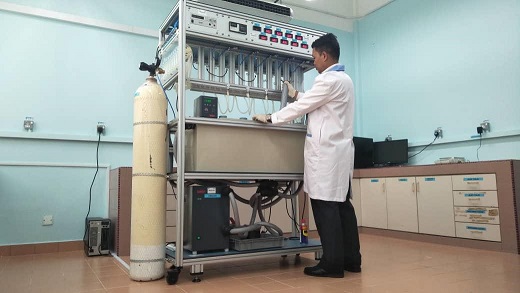
The Environmental Tracer Application Group (e-Tag) is a group in the Waste Technology & Environment Division. The e-Tag Group provides research services covering the fields of geophysics, hydrological measurement as well as the application of tracing techniques focused on related problem-solving.
The e-Tag Group provides services that cover 4 main categories, namely Laboratory Analysis, Water Resources Assessment & Management, Geophysical Techniques, and Sedimentology studies. The main laboratory analyses offered are IRMS as well as WDXRF. IRMS (Isotope Ratio Mass Spectrometry) is used for stable isotope analysis while WDXRF (Wavelength Dispersive X-ray Fluorescence) is used for elemental analysis applications.
Other laboratory analyses that are also offered are such as 14C analysis facility using the absorption method, 3H analysis using electrolytic enrichment as well as in-situ Radon measurement in air and water. For Water Resources Assessment & Management, e-Tag offers services such as groundwater resources study, groundwater contamination study, dam-related studies, and saltwater intrusion studies.
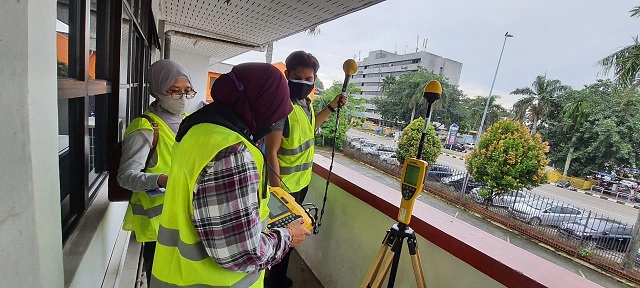
Non Ionizing Radiation is a low energy radiation, in which the spectrum covers the Extremely Low Frequency (ELF) radiation, Radio Frequency (RF), Infrared, Visible Light, Light Amplification by Stimulated Emission of Radiation (LASER) and Ultraviolet (UV). There are 3 main NIR laboratories in Agensi Nuklear Malaysia, which are Radiofrequency & Microwave (RF&MW), Extremely Low Frequency (ELF) and Ultraviolet & LASER Laboratory.
Apart from conducting research and development in the field of NIR safety in Malaysia, the NIR Group is responsible for providing technical support services and NIR expertise, offers technical safety assessments, consultation services, courses and training to the industries, government agencies and the general public. NIR Group has been accredited ISO/IEC 17020 for safety assessment of Radio Frequency (RF) from 300kHz to 18GHz.
Services offered by NIR group are as following:
- NIR safety assessment - RF, ELF, LASER & UV
- NIR safety assessment (ELF, RF & UV) on consumer products
- Collaboration projects with companies in NIR safety
- Public awareness program and involvement in exhibitions
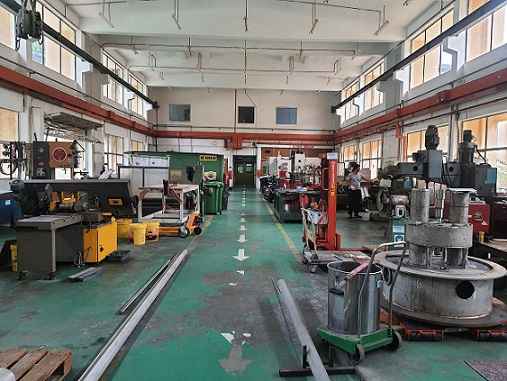
The Prototype and Plant Development Center (PDC) and the IInstrumentation and Automation Centre (PIA) are units under the Technical Support Division (BST) established specifically to provide engineering services and technical support to research and development activities at the Agensi Nuklear Malaysia.
PDC is a reference center in the field of mechanical engineering, especially in the development of prototypes and building pilot lodge facilities. It provides services such as building automation systems for research and development, engineering engineering, fabrication and machining, component assembly and manufacturing of mechanical equipment used in the nuclear and radiation fields. PDC provides disassemble of irradiation equipment and has Mobile Hot Cell facility which that capable to handle gamma-sealed source radioactive material up to 2000 Curie Cobalt 60.
PIA provides two main services, namely operations and maintenance services which include maintenance, testing, commissioning, training and consultancy services and research and development of electronic equipment and instrumentation. It is includes research and laboratory equipment; communication systems (telephone/PABX and radio systems) and safety systems that include access & perimeter control systems and fire alarm systems.
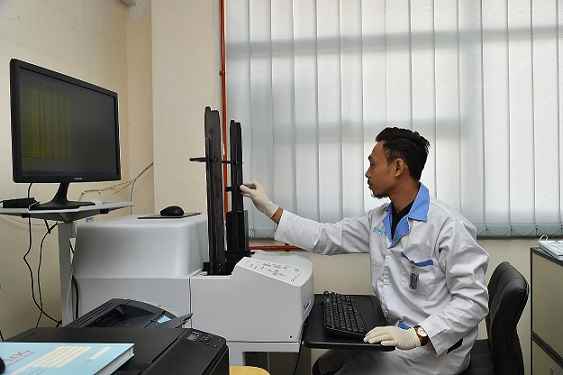
Radiochemistry and Environment Laboratory (RAS) is a unit under the Waste and Environmental Technology Division (BAS), which is responsible in for developing and strengthening radioactivity analysis techniques in environments and food samples. It was established in 1984 as a centre of the research facility.
Currently, RAS laboratory also provides radioanalytical services for government agencies and commercial needs. The RAS Laboratory has been practiced its own QA/QC and management procedures where it this laboratory has been accredited with MS ISO/IEC 17025:2017 since December 2005 by the Department of Standards Malaysia for the scope of gamma radioactivity analysis.
Currently, the RAS laboratory is the only national laboratory approved and recognised by the Ministry of Health (MOH) to conduct radioactivity measurements in food samples for export purposes and mineral water as well as bottled drinking water as a part of MOH licensing requirements.
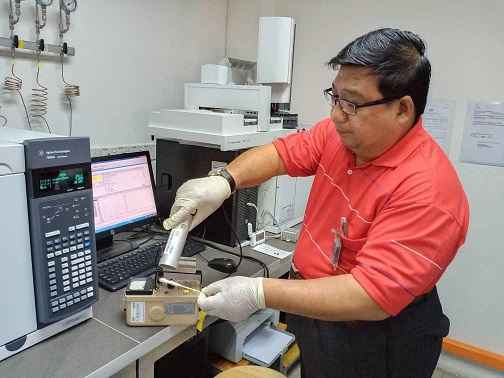
Health Physics Group (KFK) provides expert services in monitoring and analysis in the field of radiation and nuclear safety that covers the areas of radiological safety and environmental safety.
Sealed Source Leak Test is one of the radiation protection compliance requirements for the operation of sealed source radiation equipment. A leak test is a smear/swipe test carried out on the intended sealed source to ensure the integrity of the source container/sealed source shield to detect contamination and radiation leakage.
Nuclear Malaysia provides certified leak testers to determine the leakage of radiation sources used in industry and other applications. Sealed source integrity testing activities are conducted annually to meet the legal requirements (Act 304).
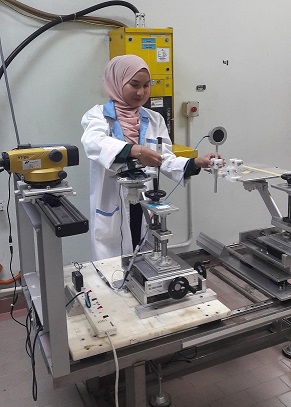
Since year 2000, MPL have been one of the holder of Class H License KKM/R/0725 from the Ministry of Health Malaysia (KKM) for Quality Control Testing (QA) services of medical diagnostic x -ray apparatus, lead equivalent thickness test for medical x -ray room and the dose calibrator calibration in nuclear medicine .
MPL is also the only standard laboratory to offer calibration services of quality control (QA) test equipment for medical diagnostic x-ray apparatus in Malaysia and Southeast Asia. MPL Standard Laboratory has been accredited MS ISO/IEC 17025 by the Malaysian Laboratory Accreditation Scheme (SAMM) since 2011. In addition, MPL also offers lead equivalent thickness testing of radiation protection shielding and PPE samples, PPE integrity testing, radiation scattering testing and thyroid counter calibration.
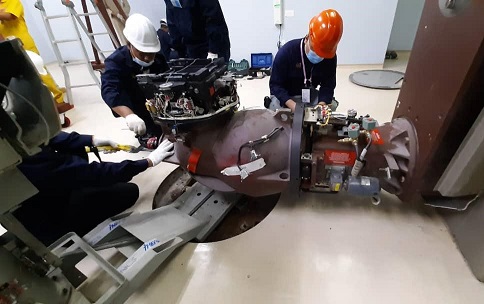
WasTeC is the National Radioactive Waste Management Center that has been entrusted by the government for the management of radioactive waste in Malaysia. It was established in 1984 as one of the units in the Agensi Nuklear Malaysia known as the Waste Management Unit (PPS) before being rebranded as WasTeC and placed under the Waste Technology and Environment Division (BAS).
WasTeC provides collection, treatment, conditioning, storage and disposal of radioactive waste obtained from the manufacturing industry, hospitals, schools, educational institutions and research laboratories. Waste received includes solid waste, liquid and disused sealed radioactive sources (DSRS). WasTeC also offers services in the field of municipal solid waste management (MSW).
WasTeC is equipped with a professional and skilled workforce as well as the facilities required for radioactive waste management activities. Customers for this service consist of various sectors, which use radioactive materials in their operations such as industry, medicine, institutions of higher learning and others. The services offered by WasTeC have also received an ISO 9001: 2015 rating for quality management system by SIRIM since 2018.
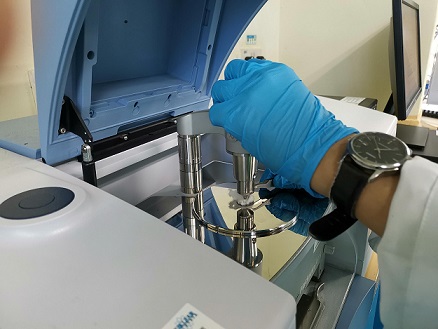
Makmal Teknologi Sinaran (MTS) under the Radiation Processing Technology Division (BTS) that focuses on polymer processing, testing and analysis activities. MTS are well equipped with semi-industrial scale plastic processing machines, state-of-the-art scientific equipment and manned with competent personnel in the polymer processing field. Additionally, MTS has years of experience in developing custom test methods based on client’s requirements in meeting international standards such as ISO, BS, ASTM etc. The laboratories provide a wide range of testing and analytical services for academic, industries as well as pilot production purposes.
1. Sample preparation/ Polymer processing
Several polymer processing equipment of lab scale and pilot scales are available for rent. The machines can be used for thermoplastic, thermoset, composite, polymer blend, biopolymer, rubber and membrane.
2. Material Characterization
Services under this category comprises physical, mechanical, thermal, chemical, dilute solution properties and morphological studies. Generally, these tests are designed to study changes that occur as a result of certain modification works on a polymer or other material.
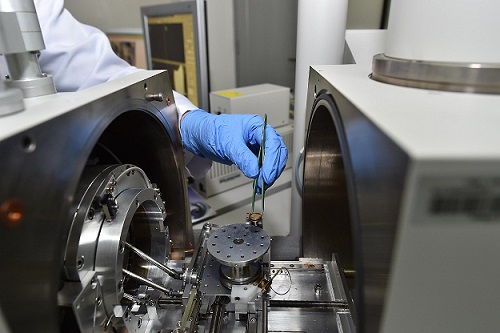
The Materials Technology Group (MTEG) conducted R&D&I&C activities in the field of ceramic, metallurgy, corrosion protection, nano-materials, biomaterials, radiation shielding, radiation damage, electronic materials, minerals, sensors, heritage preservation, mineral processing, nuclear instrumentation as well as modeling and simulation.
MTEG has gained good credentials and innovative approach in conducting a variety of characterization and tests on the mechanical, microstructural, morphology, thermal, physical and chemical properties of the materials in various conditions. MTEG has not only established itself as a solution provider for customers in materials science and engineering, but it is also a one -stop service center that provides material characterization services essential for materials research, development and product commercialization.
The MTEG laboratories provide materials processing, synthesis and characterization services and are equipped with various important and sophisticated equipment such as such as XRD, FESEM/EDX/WDX, SEM/EDX, EDXRF, WDXRF, Confocal Raman Spectrometer, AFM, STA, SAXS, SANS, Neutron Radiography, UV-Vis Spectrometer, Photoluminescence Spectrometer, Sparks Emission Spectrometer, Particle-Size Analyzer, Potentiostat, Corrosion Analyzer, Hardness Tester, Universal Testing Machines, Spin Coater, Sputter Coater and Electrospinning System.
Click here for list of equipment at MTEG
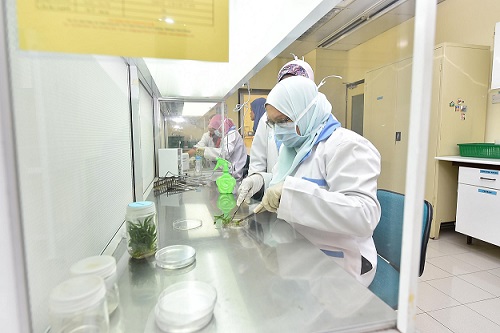
The Agro Technology and Bioscience Laboratory (TAB) is a service center in the Agrotechnology and Bioscience Division that offers various services related to agrotechnology and biosciences.
With the expertise and facilities available at this service center, customers may choose to apply for services directly or come for discussions to get insights and technical advice from relevant subject matter experts before applying for services.
Services offered by TAB include gamma irradiation, external services and consultation, courses, production and analysis.
The TAB service center has the main facilities and equipment such as:
- Tissue culture laboratory (Flora Vitro Laboratory and Incubation Laboratory Block 61)
- Biobeam GM8000 irradiation chamber
- Gamma Green House
- Photostimulated luminescence (PSL) instrument
- Microbiology Laboratory
- Transgenic Glasshouse Bio Design Facility
